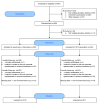The Personal Patient Profile-Prostate decision support for men with localized prostate cancer: a multi-center randomized trial
- PMID: 22153756
- PMCID: PMC3349002
- DOI: 10.1016/j.urolonc.2011.10.004
The Personal Patient Profile-Prostate decision support for men with localized prostate cancer: a multi-center randomized trial
Abstract
Objective: The purpose of this trial was to compare usual patient education plus the Internet-based Personal Patient Profile-Prostate, vs. usual education alone, on conflict associated with decision making, plus explore time-to-treatment, and treatment choice.
Methods: A randomized, multi-center clinical trial was conducted with measures at baseline, 1-, and 6 months. Men with newly diagnosed localized prostate cancer (CaP) who sought consultation at urology, radiation oncology, or multi-disciplinary clinics in 4 geographically-distinct American cities were recruited. Intervention group participants used the Personal Patient Profile-Prostate, a decision support system comprised of customized text and video coaching regarding potential outcomes, influential factors, and communication with care providers. The primary outcome, patient-reported decisional conflict, was evaluated over time using generalized estimating equations to fit generalized linear models. Additional outcomes, time-to-treatment, treatment choice, and program acceptability/usefulness, were explored.
Results: A total of 494 eligible men were randomized (266 intervention; 228 control). The intervention reduced adjusted decisional conflict over time compared with the control group, for the uncertainty score (estimate -3.61; (confidence interval, -7.01, 0.22), and values clarity (estimate -3.57; confidence interval (-5.85,-1.30). Borderline effect was seen for the total decisional conflict score (estimate -1.75; confidence interval (-3.61,0.11). Time-to-treatment was comparable between groups, while undecided men in the intervention group chose brachytherapy more often than in the control group. Acceptability and usefulness were highly rated.
Conclusion: The Personal Patient Profile-Prostate is the first intervention to significantly reduce decisional conflict in a multi-center trial of American men with newly diagnosed localized CaP. Our findings support efficacy of P3P for addressing decision uncertainty and facilitating patient selection of a CaP treatment that is consistent with the patient values and preferences.
Keywords: Decision making; Decisional conflict; Internet; Prostate cancer; Randomized trial.
Copyright © 2013 Elsevier Inc. All rights reserved.
References
-
- Siegel R, Ward E, Brawley O, Jemal A. Cancer statistics, 2011: The impact of eliminating socioeconomic and racial disparities on premature cancer deaths. CA Cancer J Clin. 2011;61:212–36. - PubMed
-
- Wilt T. The VA/NCI/AHRQ CSP #407: Prostate cancer intervention versus observation trial (PIVOT): main results from a randomized trial conparing radical prostatectomy to watchful waiting in men with clinically localized prostate cancer. Presented at the American Urological Association Annual Meeting Plenary Session; Washington DC. May 17, 2011.
-
- Prostate Cancer Panel. Prostate Cancer, NCCN Clinical Practice Guidelines in Oncology. National Comprensive Cancer Network; 2010.
-
- O’Rourke ME, Germino BB. Prostate cancer treatment decisions: a focus group exploration. Oncol Nurs Forum. 1998;25:97–104. - PubMed
-
- Berry DL, Ellis WJ, Schwien CC, Woods NF. Treatment decision making by men with localized prostate cancer: the influence of personal factors. Urologic Oncology. 2003;21:93–100. - PubMed
Publication types
MeSH terms
Grants and funding
LinkOut - more resources
Full Text Sources
Other Literature Sources
Medical
Miscellaneous


